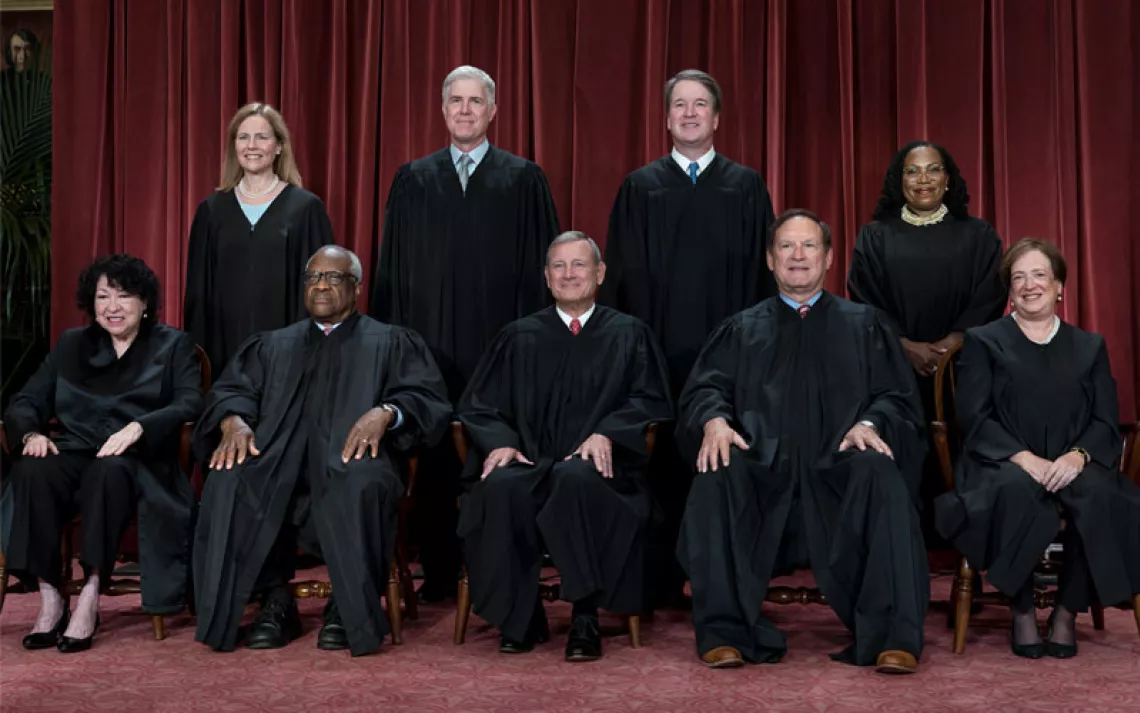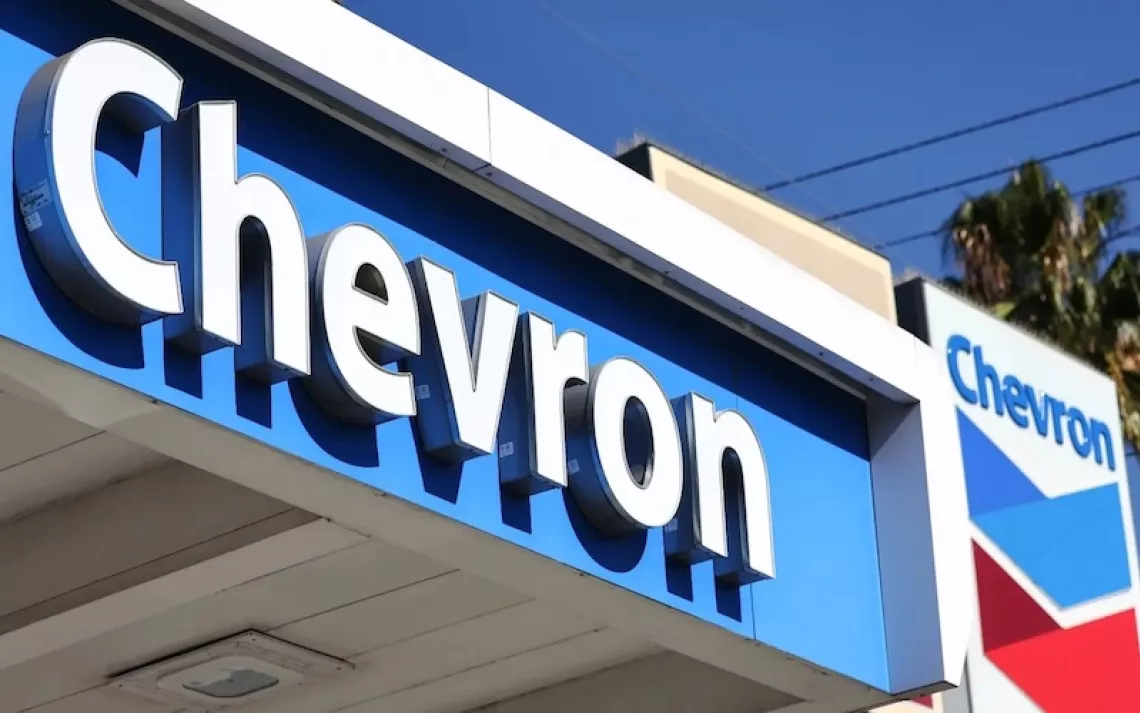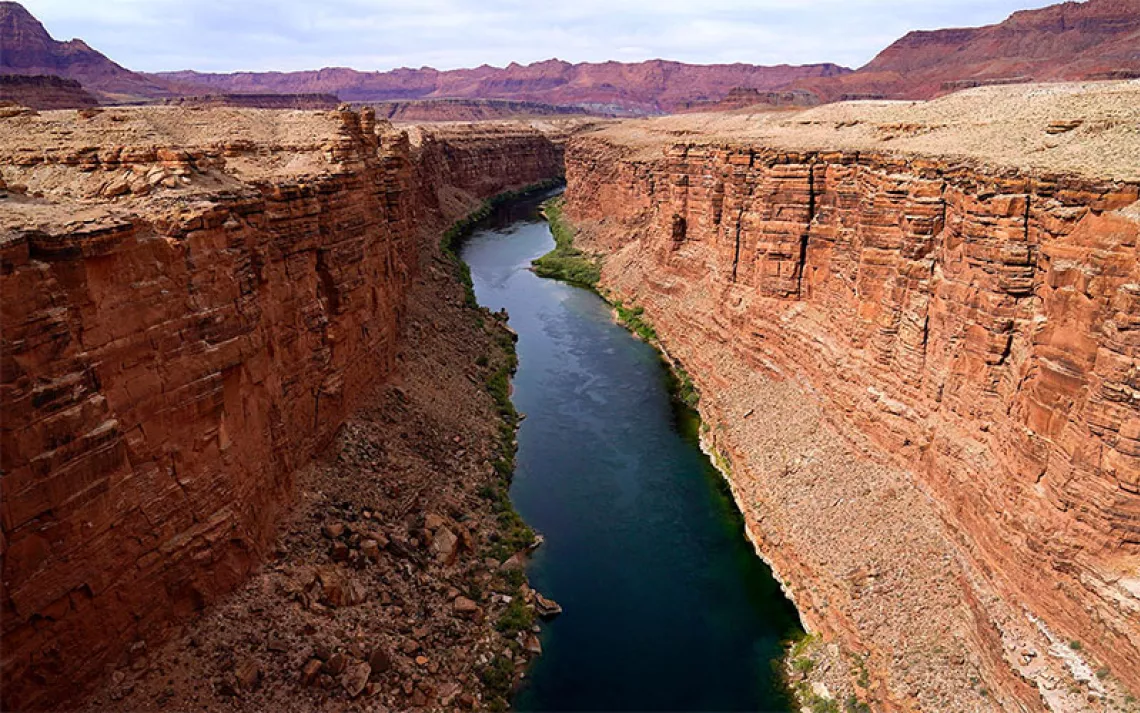The Supreme Court v. A Livable Planet
An upcoming climate case is nothing less than an attempt to dismantle modern government

Photo by Amy Sparwasser/iStock
Later this month, on February 28, the United States Supreme Court will hear arguments in a case that could determine not just how but whether the federal government is able to limit dangerous carbon pollution from power plants. West Virginia v. EPA is ostensibly about the fine print of the Clean Air Act and whether it gives the EPA the authority to regulate greenhouse gas emissions from coal-fired power stations.
But the petitioners in the case—West Virginia and two coal companies, joined by a phalanx of Republican-controlled state governments and ultraconservative think tanks—are pursuing something more ambitious. In asking the court to assess “fundamental questions about the size and scope of government,” the complainants hope to upend long-settled case law and to accomplish a 50-year goal of the conservative movement: the very dismantling of modern American government.
“The immediate issue in this case is the question of greenhouse gases from power plants, and the question of the EPA’s authority to regulate greenhouse gases,” Karen Sokol, a professor at the Loyola University School of Law in New Orleans, told Sierra. “What this case is ultimately about is whether the agencies that are charged with protecting public health, public safety, and the environment can carry out their missions.”
To understand the complexities of this landmark case, we need to rewind the tape a bit. In August 2015, President Obama’s Environmental Protection Agency unveiled the Clean Power Plan, which sought to use market mechanisms to spur utilities to move away from coal and toward renewable energy. A group of 27 Republican attorneys general immediately challenged the law and called on the Supreme Court to stay the rule. In January 2016, the court agreed, in a five-to-four ruling, to suspend implementation of the Clean Power Plan.
It was an unprecedented move by the high court; never before had the justices stayed a federal regulation before the case had been heard by a lower court of appeals. For environmentalists, the court’s extraordinary action was an ominous sign that a majority of justices were prepared to place serious practical constraints on the EPA’s authority to regulate greenhouse gases under the Clean Air Act, even though the court had affirmed that authority in a 2007 ruling.
When Donald Trump became president, his administration swiftly scrapped the Clean Power Plan. Trump’s EPA then worked to establish a replacement regulation, the Affordable Clean Energy rule. But that too quickly ended up in court when 22 Democratic attorneys general and environmental groups, including the Sierra Club, sued the Trump administration, arguing that the new rule was so weak that it failed to uphold the requirements of the Clean Air Act. On January 19, 2021—one day before Joe Biden was inaugurated president—the US Court of Appeals for the DC Circuit, agreeing with the environmental groups and attorneys general, invalidated the Trump rule.
Which brings us to the present, and to one of the weirdest elements of this legal saga. The Supreme Court is poised to consider a challenge to a federal regulation that never went into effect, and which the current Biden administration has no intent to revive. For environmental law experts, the court’s openness to hear the West Virginia and coal company challenge is worrisome, as it suggests that a majority of justices are willing to entertain this sweeping challenge to federal authority.
“The court went out of its way to take this case at this time, as it did in 2016,” Michael Gerrard, founder of the Sabin Center for Climate Change Law at Columbia Law School, told Sierra. “It’s extremely unusual to take a case at this procedural stage.… It’s a bad omen, I’ll say that.”
In their written arguments, the Biden administration and environmental groups have focused on the oddity of the court hearing a case in which none of the petitioners can demonstrate suffering any harm—since there’s no regulation in place at this time. “Petitioners lack standing to invoke this Court’s jurisdiction because they are not injured,” the Biden administration argues in its brief, and then goes on to state, “Petitioners' real concern is not with any extant EPA regulation, but with measures that the agency might adopt.”
In their brief, environmental and other public interest groups (including the Sierra Club), agree with the Biden administration that the court’s review of this case violates Article III of the Constitution, which states that US courts can only weigh in on actual “cases” or “controversies.” “The only truly dramatic feature of this proceeding is a conspicuous absence of Article III jurisdiction,” the public interest groups argue. “Petitioners’ primary complaints, then, are about how EPA might exercise its authority in future rulemaking. But such anticipatory claims are unripe.”
The claims by West Virginia and the coal companies may be procedurally “unripe” and therefore constitutionally dubious. But, politically, the petitioners’ arguments reflect the over-ripe culmination of a decades-long ideological campaign to dismantle the legal foundations of modern government.
“What the fossil fuel industry, as well as the red states, would ideally like [the court majority] to do is really just dispense with the EPA’s authority to regulate greenhouse gases,” Sokol said. “And if the court takes the bait, then that calls into question, not just can EPA regulate outside the fence line but also will it retain its greenhouse gas authority, period.… Taken to its logical conclusion, their argument effectively hobbles any sort of meaningful agency authority to respond to the greatest public health and safety threat we’ve ever faced."
Such talk isn’t just lawyers jumping at shadows. In their official arguments, the coal companies, Republican-controlled states, and conservative think tanks make plain that their ultimate goal is to take down what they pejoratively refer to as “the administrative state.”
*
West Virginia attorney general Patrick Morrisey and his co-petitioners want the Supreme Court to place extreme limits on the federal government’s power through a radical reconsideration of the “major questions” doctrine, which, they claim, prohibits federal agencies from issuing rules of a “vast economic and political significance” unless Congress provides laser-precise statutory language authorizing them to do so. In other words, the petitioners want to stop federal agencies from having the authority to do much at all. And they want to do so via “judicial diktat” (to borrow a phrase from the dissent from Justices Breyer, Kagan, and Sotomayor in the recent case about federal COVID-related mandates). “Their petition is a bait-and-switch,” Sokol argues.
If the Supreme Court accepts the petitioners’ arguments about limits on the powers of federal agencies, every agency’s ability to do its job could be diminished. The Food and Drug Administration would have less capacity to protect us from contaminated food and drugs, the Consumer Protection Financial Bureau to crack down on fraud, and the Securities and Exchanges Commission to shield us from the consequences of Wall Street’s risky bets.
This latest conservative legal gambit is the result of nearly five decades of organizing by the extreme Right and their allies in the fossil fuel industry. The beginning of the ultra-Right’s focus on the courts was the 1971 Powell Memo, written by soon-to-be Supreme Court Associate Justice Lewis Powell. He argued that to protect American capitalism from “broad attack,” corporations had to work to gain influence over the courts. In the ensuing decades, wealthy right-wing ideologues like the Koch brothers ramped up their investments in attorneys general elections through a shadowy network of PACs and astroturf groups. In 2020, for example, Koch-funded organizations and PACs contributed a whopping $8,754,057 to Morrisey’s campaign for attorney general.
The Kochs and other wealthy free-market fundamentalists have also funded a network of academic institutes and think tanks that have brought their fringe libertarian beliefs into the mainstream—a strategy that has certainly borne fruit in West Virginia. In an amicus brief filed in this case, Democratic senators Richard Blumenthal, Bernie Sanders, Elizabeth Warren, and Sheldon Whitehouse make this point forcefully: “Almost everything about these cases … is an industrial byproduct manufactured in an effort to return to an era free from oversight by the government. The theories and arguments were incubated, grown, propagated, and distributed by a well-funded apparatus that has selfish and destructive goals.”
A few decades into the right-wing push for the courts, ultraconservatives began to focus on changing the status quo by targeting the offices of states’ attorneys general. In 2002, a former Alabama attorney general, William Pryor, founded the Republican Attorney Generals Association (RAGA). Pryor believed that one of the only legitimate uses of state power was the promotion of free trade. To him, even things like securing public safety, offering public education, and protecting people from discrimination were examples of vast federal overreach. RAGA found eager supporters for its vision in Koch Industries, fossil fuel companies, and the far-Right Judicial Crisis Network.
RAGA began as a fundraising vehicle, says political science professor Paul Nolette, author of Federalism on Trial: State Attorneys General and National Policymaking in Contemporary America. But it quickly morphed into a powerful force for the politicization and polarization of Republican attorneys general by organizing them to combat “federal overreach” in all its forms.
After RAGA’s founding, Republican AGs collaborated much more frequently on multistate lawsuits, especially those opposing the actions of Democratic administrations, Nolette found. In the Clinton years, for example, the Republican AGs filed five partisan, multistate lawsuits. During the Obama administration, that figure soared to 78. Biden’s first year offers evidence that the trend is accelerating: Republican AGs have already filed 35 lawsuits against his policies. In just one year, that’s almost half of the number of lawsuits as RAGA filed against President Obama’s actions during his entire eight-year term.
RAGA has also helped to deepen the ties between Republican attorneys general and the fossil fuel industry. It offers corporate members, which include coal-reliant utilities and fossil fuel corporations, the chance to have closed-door meetings with attorneys general for $125,000 a pop.
It would be too simple to pin the cozy relationship between Republican AGs and the fossil fuel industry entirely on RAGA, however. The industry’s generous support of attorney generals’ campaigns has almost certainly also played a role. Around 2014, AGs and fossil fuel companies began to team up in unprecedented ways, The New York Times found. Instead of filing lawsuits against companies that break environmental laws, these AGs worked with industry to take down federal environmental rules and to push damaging deregulatory efforts through state legislatures.
For example, in 2012, corporate lobbyist and former Virginia attorney general Andrew P. Miller, whose clients include TransCanada, backer of the failed Keystone XL Pipeline, pitched then–Oklahoma attorney general Scott Pruitt on the creation of a national “strike force” against what they viewed as the EPA’s overreach. “Like the dalmatian at the proverbial firehouse, it could move out smartly when the alarm sounded,” he wrote in a letter to Pruitt.
West Virginia’s Morrisey is part of this wave of politicized, pro-industry attorneys general. He is a top beneficiary of campaign cash from RAGA, having received nearly $7 million from the association during his 2020 campaign for attorney general. Morrisey is also a director of RAGA’s policy arm, the Rule of Law Defense Fund, which paid for robocalls asking people to come to the Capitol on January 6, 2021.
Morrisey seems to have embraced his role as part of Miller’s anti-environmental “strike force,” filing numerous lawsuits against the EPA. The Times found that he pushed a bill that would make it easier for West Virginia to sue the Obama administration over the Clean Power Plan in the state legislature—a bill Miller drafted for him in its entirety.
*
If Morrisey and his cohort win their case before the Supreme Court, it would represent a major payoff for the ultraconservative, ultrawealthy families (as well as their fossil fuel allies) who are eager to decapitate the modern government. Not only would a sweeping decision on the “major questions” doctrine allow power plants to continue emitting huge amounts of greenhouse gases into the atmosphere, it would also limit nearly all federal agencies’ ability to impose rules on corporations that protect public health and welfare. Say hello to securities fraud, salmonella-infected chicken, and sinking cities.
Courtney Hight, director of the Sierra Club’s Democracy Program, argues that should the court accept the ideological arguments of West Virginia et al, “It will spread distrust of the courts,” she argues, “and erode trust in democracy at all levels.”
If the Supreme Court takes West Virginia and the coal companies up on their invitation to dismantle modern government, the court’s reputation will suffer along with public welfare. And it’s difficult to see how that will do anything other than to increase the calls for reforming what seems like an unaccountable and increasingly overreaching institution.
 The Magazine of The Sierra Club
The Magazine of The Sierra Club



